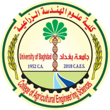Welcome to the Medicinal and Aromatic Plants Unit Labs at the College of Agricultural Engineering Sciences, University of Baghdad. Our laboratories are dedicated to the specialized study of bioactive compounds, providing an advanced environment for high-level Medicinal Plants research. We focus on the identification, analysis, and cultivation of therapeutic flora to support pharmaceutical and agricultural innovations.
The Medicinal and Aromatic Plants Unit Labs serve as a vital center for scientific exploration within the College of Agricultural Engineering Sciences. By utilizing automated analysis and biological testing, we facilitate groundbreaking Medicinal Plants research that explores the potential of aromatic species in modern medicine and industry. Our facilities are designed to support postgraduate studies with precision and technical excellence.
Below, you can explore the specialized list of laboratories and research units available within our unit:
About the Lab
The laboratory specializes in the field of cultivation and propagation of medicinal and aromatic plants outside the living organism. It allows for conducting specific experiments and fundamental methods for the stages of sterilization, propagation of medicinal and aromatic plants, and stimulating and increasing secondary compounds in the plants. Subsequently, plant acclimatization and cultivation take place in the permanent field. The laboratory is equipped with several devices, such as an autoclave sterilizer, a cultivation cabinet, an incubation room equipped with a split system to control temperature and cold, a sensitive scale, and a pH meter.
The laboratory was established in 2012 to benefit graduate students and faculty
Vision, Message, and objectives of the Lab
About the Lab
Vision, Message, and Objectives of the Lab
About the Lab
Vision, Message, and Objectives of the Lab











